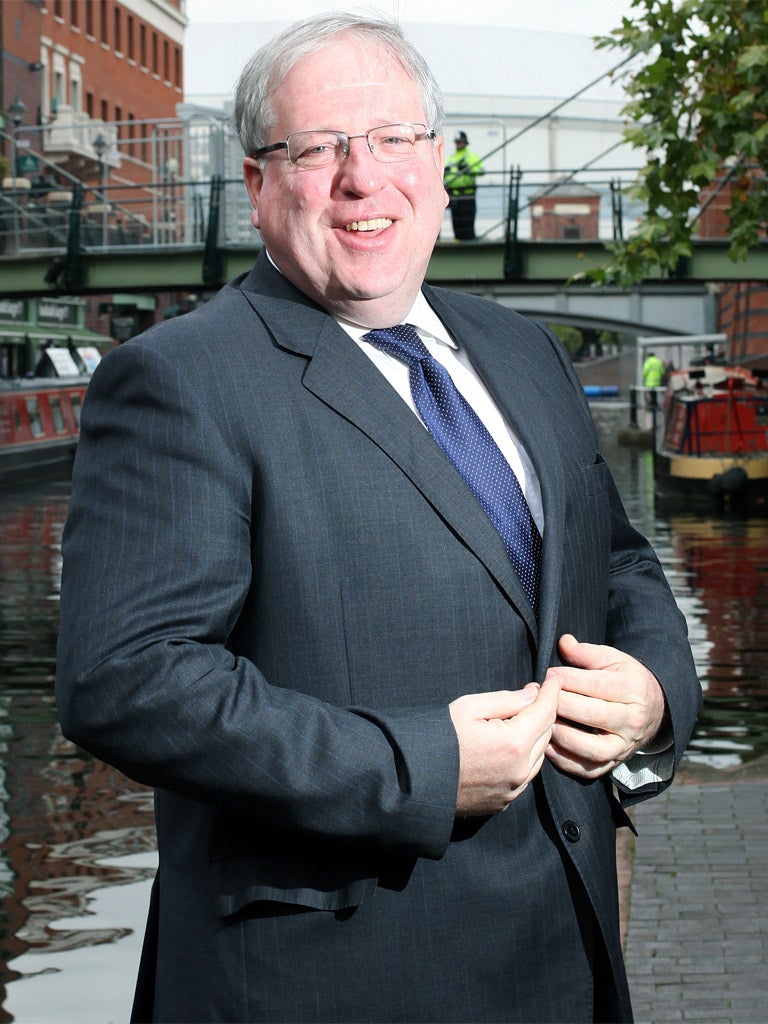Patrick McLoughlin: Tory from wrong side of the tracks
The new Transport Secretary tells Oliver Wright where he goes now after the West Coast rail fiasco

It would be fair to say that Patrick McLoughlin isn't your stereotypical Conservative Cabinet minister. He didn't go to Eton – he left his comprehensive school in Cannock, Staffordshire, at the age of 16 without any qualifications.
He didn't follow the usual route to Tory high office, such as a spell in the City or a legal career at the Bar. Instead, he started his working life as a farm labourer before "moving up" to work as a miner, becoming the third generation of his family to do so.
And, in an age of "celebrity" politicians, Mr McLoughlin, the MP for the Derbyshire Dales, has a conspicuously low profile. He rarely gave interviews in his previous job as David Cameron's Chief Whip, and instead concentrating his efforts on the dark arts of keeping the restive Tory MPs going through the correct lobbies and supporting the Government.
But in the past six weeks all that has changed. Last month, the 54-year-old was promoted in the reshuffle to become Secretary of State for Transport, with a brief to deal with the thorny and controversial issues of Britain's airport expansion and new high-speed rail link.
As if that were not enough, last week another rather pressing problem dropped uncomfortably into his inbox: the fiasco of his department's handling of the West Coast Main Line franchise. If he had wanted to keep a low profile, that is simply no longer an option. "It has come very much into vogue these days," he says, wryly, "But when Harold Macmillan was asked what he feared most as Prime Minister he replied – 'events'. I think this comes into the category of events."
Mr McLoughlin has ordered two reviews into what went wrong with the franchise process, but reveals that it was not a single mistake that led him to overturn the decision of his predecessor, Justine Greening, to hand the 15-year West Coast contract to FirstGroup. "If it had been a simple technical matter, I would not have suspended the whole process," he says. "It was a number of things that led me to take the decision. Any minister relies upon the advice and the help he is given, and I was given categorical assurances that it was OK. Now something went wrong and we're going to learn from that."
In person, Mr McLoughlin is unlike most senior Conservative politicians. He is frank, down to earth (when he doesn't want to answer a question, he says so, rather than skirting round the subject) and, with his background, he is someone you would assume would be more at home in the ranks of the Labour Party.
So why is he a Conservative? "When I was growing up, Harold Wilson was Prime Minister and I was unimpressed by him," he says. "My father died when I was very young. My mother had to struggle very hard to bring up my sister, and we didn't get any help and support from Labour."
His desire to enter Parliament was eventually stirred during a school trip to the House of Commons organised by his local MP. "I remember thinking, when we were walking around, that one day I want to come back here as a Member of Parliament," he says. "I didn't quite know how I was going to do it. It wasn't the sort of thing that you went to your careers teacher and say you wanted to be an MP. It was more like a postman if you were lucky down the colliery. But that's what gave me the bug." As a result he joined the Tory party and his break came in 1986 when, aged just 29, he was the surprise choice to fight a by-election triggered when Matthew Parris resigned his West Derbyshire seat. Mr McLoughlin scraped home with a majority of 100.
"The day I took my seat in Cabinet, my mother came down to watch me and we were invited into the Margaret Thatcher's study in the Commons," he recalls. "Now my mother had never met a senior politician of any description, and all of a sudden she's with the Prime Minister. But within two minutes I was completely irrelevant. They were talking away there like two old bloody fishwives for about 30 minutes."
A quarter of a century on, Mr McLoughlin has achieved far more than most of his Conservative contemporaries, who came from far more privileged backgrounds. So what would he like his legacy to be? He pauses. "At the moment, I'll just concentrate on showing people I can do the job. Do it well. Other people can decide what my legacy is."
Join our commenting forum
Join thought-provoking conversations, follow other Independent readers and see their replies
Comments
Bookmark popover
Removed from bookmarks